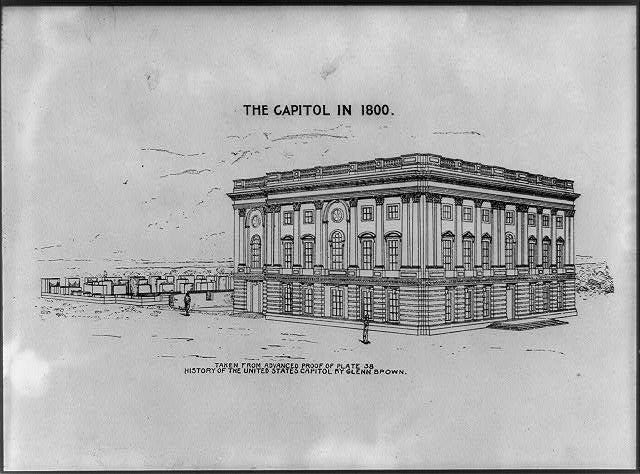This Day in Legal History: US Capitol Opens
On November 17, 1800, the United States Congress convened for the first time in the new Capitol building in Washington, D.C., marking a foundational moment in American legal and political history. The relocation came after a decade of Congress meeting in temporary quarters, most recently in Philadelphia, as the young republic grappled with questions of permanence and national identity. Washington, D.C. had been selected as the capital through the Residence Act of 1790, a political compromise that helped balance regional power between North and South. By 1800, the city remained largely undeveloped, and the Capitol itself was still under construction—only the north wing was usable.
Despite its incomplete state, the Capitol’s occupation by Congress signaled the institutional maturity of the federal government. It gave physical shape to the separation of powers by housing the legislative branch in its own dedicated space, distinct from the executive and judiciary. This move also underscored the federal character of the American system, establishing a neutral location not belonging to any one state. John Adams, still president at the time, had moved into the President’s House (now the White House) just weeks earlier, completing the federal trifecta.
The decision to proceed with the session in an unfinished building reflected a commitment to constitutional governance and the rule of law, even in the face of logistical and environmental hardships. Lawmakers contended with the muddy streets and sparse accommodations of the nascent city, yet their presence inaugurated what would become one of the most symbolically and functionally important legislative chambers in the world. This moment laid the groundwork for Washington, D.C. to become not only the seat of American government but a focal point for legal development, political conflict, and democratic debate for centuries to come.
More than 500 lawsuits alleging that Tylenol use during pregnancy causes autism in children may be revived, as the U.S. Court of Appeals for the Second Circuit prepares to hear arguments from plaintiffs challenging a 2024 dismissal of their cases. A lower court had rejected the claims after finding that the plaintiffs’ expert testimony lacked scientific rigor, a conclusion supported by Tylenol maker Kenvue. The plaintiffs argue the judge mischaracterized their experts’ findings and are citing public support from President Trump and health officials, who linked autism to Tylenol use during a September 2025 press conference.
Scientific consensus continues to hold that no definitive link exists between acetaminophen (the active ingredient in Tylenol) and autism, a position echoed by Kenvue. The company is also facing a separate suit from Texas Attorney General Ken Paxton, who accuses Kenvue of concealing risks to children, though a Texas judge recently denied Paxton’s efforts to halt a $398 million shareholder dividend and restrict Tylenol marketing. Meanwhile, it remains uncertain whether the appeal will impact Kimberly-Clark’s pending $40 billion acquisition of Kenvue, though both companies have indicated that litigation over autism claims won’t derail the deal.
US appeals court to weigh reviving cases over Tylenol and autism | Reuters
Gupta Wessler, a boutique appellate firm in Washington, D.C., known for its U.S. Supreme Court advocacy on behalf of plaintiffs, has hired Matthew Guarnieri, a former assistant to the U.S. solicitor general. Guarnieri argued 13 Supreme Court cases under both the Biden and Trump administrations and is the first attorney to leave the solicitor general’s office for a firm that exclusively handles plaintiff-side appellate work. His move reflects a growing recognition of Gupta Wessler’s nontraditional model, which competes with corporate-heavy appellate practices at larger firms.
Guarnieri becomes the fifth principal at the 18-lawyer firm, which is currently involved in high-profile litigation, including representing Consumer Financial Protection Bureau employees challenging President Trump’s mass firings and securing a $185 million verdict against Monsanto over chemical contamination. The firm also represents Uber passengers alleging sexual assault and recently blocked an attempt in Nevada to limit contingency fees in civil cases. Guarnieri left the DOJ in October after nine years of service; the department declined to comment on his departure.
DC appellate firm picks up departing DOJ Supreme Court advocate | Reuters
A federal jury in California has ordered Apple to pay $634 million to Masimo, a medical technology company, for infringing a patent related to blood-oxygen monitoring used in Apple Watches. The jury found that specific features like workout mode and heart rate notifications violated Masimo’s patent rights. Apple has announced plans to appeal, arguing that the patent in question, which expired in 2022, covers outdated technology and that most of Masimo’s other patent claims have been invalidated.
This verdict is part of a broader legal conflict between Apple and Masimo, which accuses Apple of poaching employees and misappropriating pulse oximetry technology. In 2023, the U.S. International Trade Commission imposed an import ban on certain Apple Watch models, prompting Apple to remove the disputed feature and later reintroduce it with customs approval. A new ITC review is now underway to determine if the updated models should also be banned. The legal fight spans several courts and includes ongoing challenges from both companies over import restrictions and intellectual property claims.
US jury says Apple must pay Masimo $634 million in smartwatch patent case | Reuters













